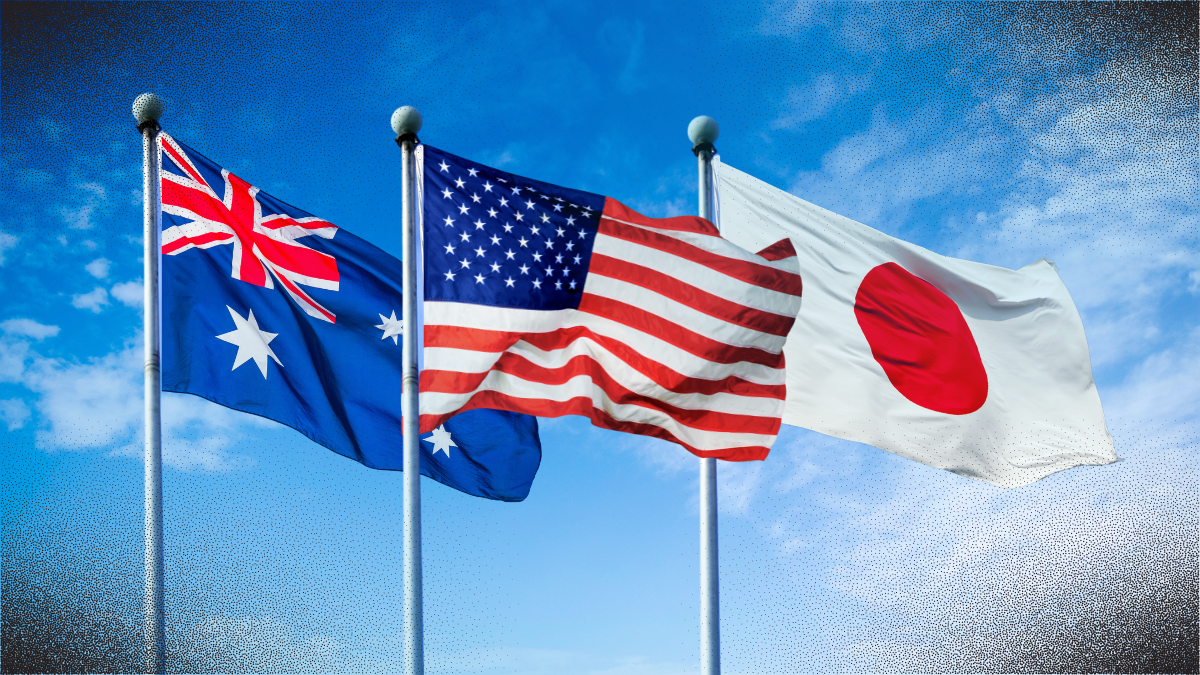HONOLULU—The United States, Australia and Japan have agreed to provide “coordinated security assistance” to the Philippines to strengthen the country’s military capabilities in the face of China’s growing aggressiveness in the South China Sea.
The defense ministers of the four countries—Gilberto Teodoro Jr. of the Philippines, Lloyd Austin III of the United States, Richard Marles of Australia and Minoru Kihara of Japan—met at the US Indo-Pacific Command headquarters at Camp H.M. Smith in Hawaii on Thursday to discuss ways to maintain stability and security in the region.
Austin held separate meetings with his Japanese and Australian counterparts, then all three of them together, before they met with Teodoro.
“We’re looking to conduct more maritime exercises and activities among our four countries. We also want to pursue coordinated security assistance to the Philippines that will boost interoperability and help the Philippines achieve its defense modernization goals,” Austin said at a press conference.
Historic joint sail
The meeting came a few weeks after the navies of the four countries made their historic quadrilateral joint sail in the West Philippine Sea (WPS), part of the Philippines’ exclusive economic zone (EEZ) in the South China Sea, where China has sweeping claims. A 2016 arbitral ruling voided those expansive claims but Beijing has refused to recognize the decision.
The inaugural meeting of the four nations’ top defense officials took place on the sidelines of the Shangri-La Dialogue in Singapore in June last year. At the time, Undersecretary Carlito Galvez Jr. represented the Philippines and Hamada Yasukazu represented Japan.
Marles said they discussed “increased tempo of defense exercises based on the reciprocal access agreements, the status of forces agreements” between their countries.
Kihara said it was important to work together “while the security environment around us is facing even harsher challenges.”
For his part, Teodoro said the meeting expressed a unified message “in the face of a unilateral declaration by a single theater actor,” without referring to China by name.
Tensions have risen between the Philippines and China over the West Philippine Sea. Earlier this week, Chinese coast guard ships fired water cannons at Philippine Coast Guard and Bureau of Fisheries and Aquatic Resources vessels near Bajo de Masinloc (Panatag or Scarborough Shoal), damaging both.
‘Irresponsible behavior’
Austin criticized China’s “irresponsible behavior” that “disregards international law.”
But he and Teodoro refused to say how and when the Mutual Defense Treaty (MDT) between their countries could be invoked.
The 1951 MDT binds the two countries to defend each other in case of an external attack. Austin reiterated the United States’ “ironclad” commitment to the treaty.
Teodoro said hypothetical talks on the MDT were “counterproductive.”
“It is an agreement and it will be a political decision at the end of the day,” he added.
Teodoro said that “our job as (defense) secretaries is to make sure that there are no situations, through capability building and deterrence, that an MDT situation would arise.”
‘Twin anchors’
In Manila, Foreign Secretary Enrique Manalo on Thursday said the government’s foreign policy in the South China Sea was “built on the twin anchors” of the 2016 arbitral award and the United Nations Convention on the Law of the Sea (Unclos).
“We categorically reject the excessive claims and aggressive actions by the People’s Republic of China in the WPS, for they stand in stark opposition to the rule of law and the very principles that ensure peace and stability in our region,” he said.
The arbitral ruling and the Unclos are the “bedrock” on which the country had strengthened its maritime security cooperation with other nations, Manalo said, citing support from the United States, Australia, Japan, United Kingdom, Republic of Korea, Vietnam, Indonesia and India, and the European Union.
“This reality, that we do not stand alone, is a novel one. Not so long ago, we were derided for filing protest note after protest note when our sovereignty, sovereign rights and jurisdiction were violated. Now, we have many others joining their voices to ours,” he said.
Manalo rejected China’s claim that the Philippines was just a “pawn” of the United States in the South China Sea.
Observers say that this propaganda theme has been reechoed by Beijing and its supporters to diminish the legitimacy of Manila’s protests against Chinese activities in the West Philippine Sea by portraying the Philippines as a US “vassal.”
“Involvement in this maritime and territorial struggle of global importance is happening at the behest of the Philippines—we are not bystanders to [the] situation,” Manalo said in a speech during a national security workshop organized by the Presidential Communications Office.
Manipulative
In March, China’s foreign ministry spokesperson Mao Ning accused the US of using the Philippines as a “pawn to stir up trouble in the South China Sea.”
“The Philippines should not let itself be at the mercy of the United States,” she said.
Manalo said that such a statement was “designed to manipulate people into being disengaged” from the maritime dispute with China.
“We must expose the illegality of the nine-dash line that is being used as the basis for threatening the livelihoods of our fishermen through harassment and intimidation, and for reclamation activities that degrade the environment in these vital waters. We should not allow ourselves to be painted as the aggressors or the violators,” he added. —WITH A REPORT FROM JANE BAUTISTA
